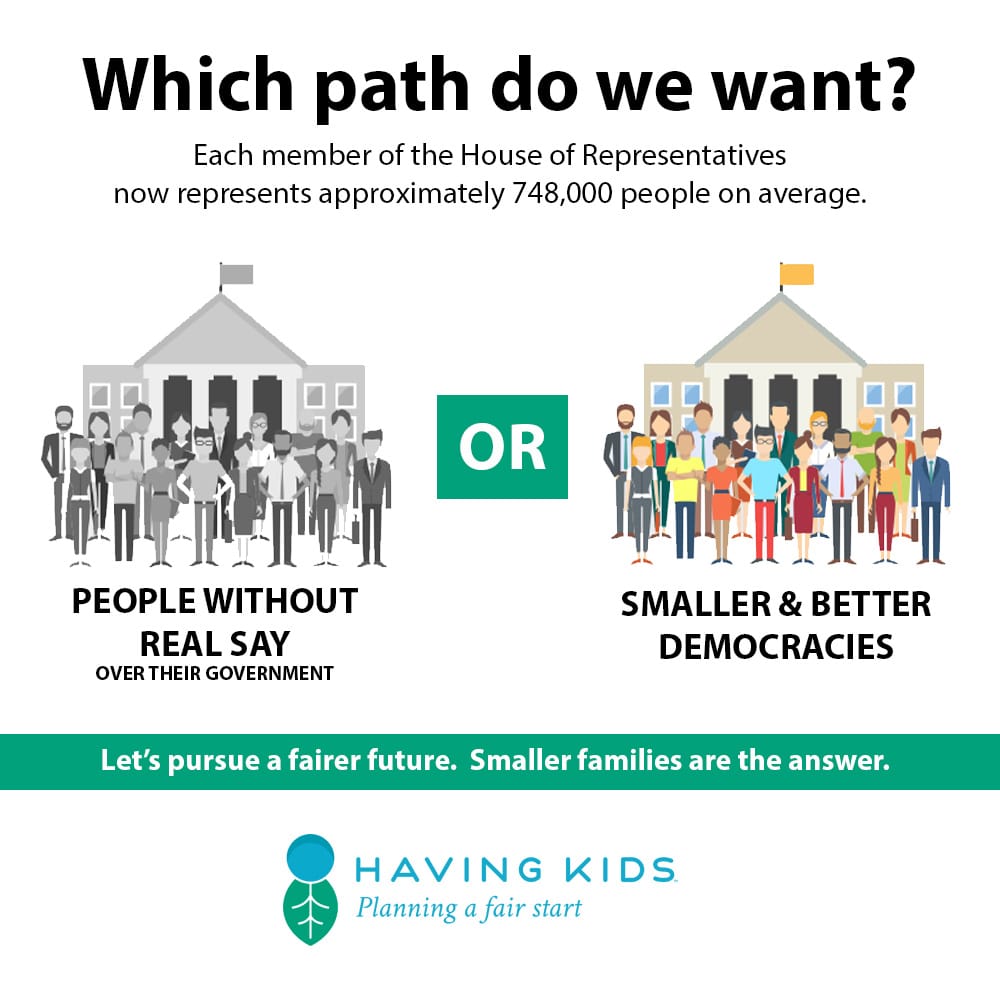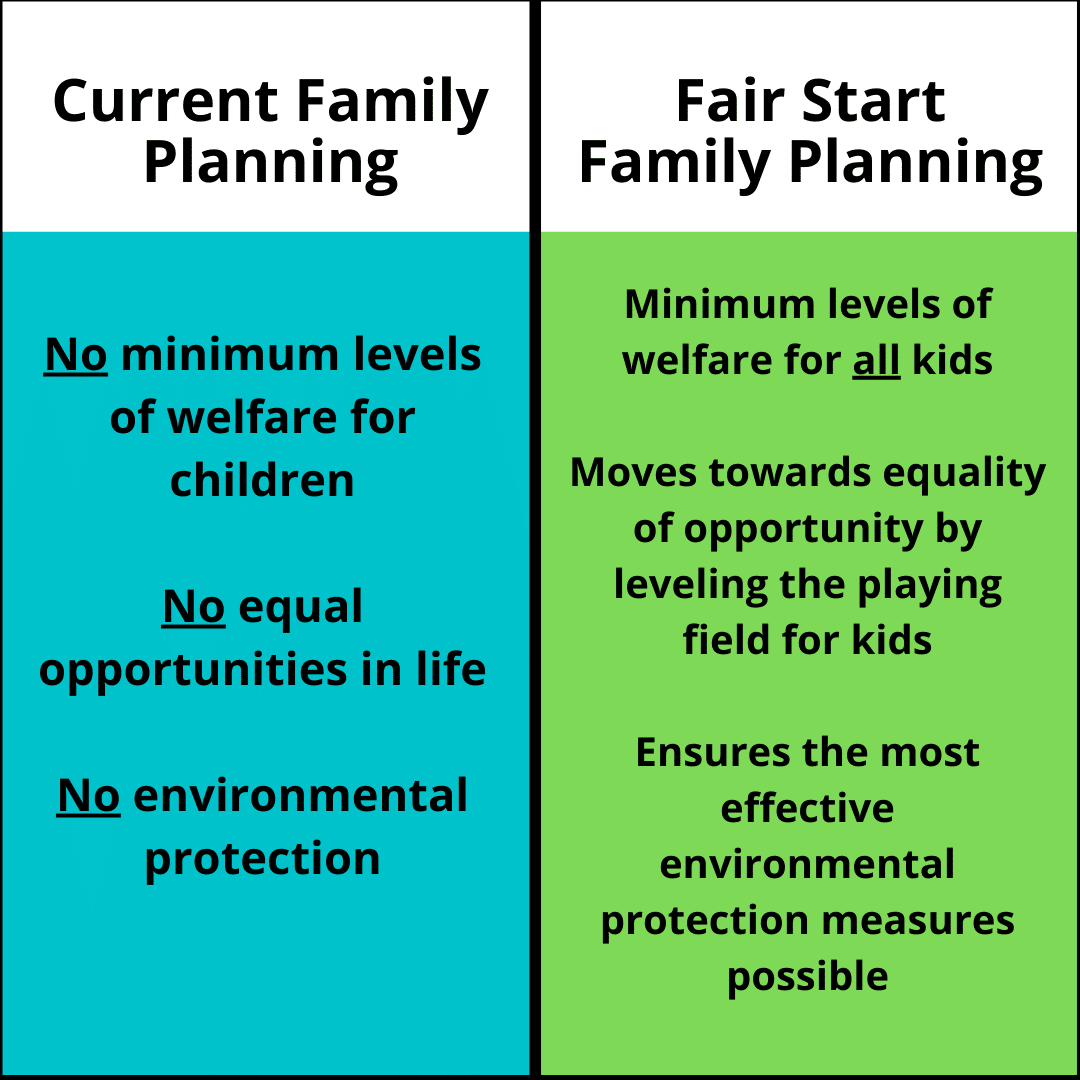The zero baseline model (ZBM, or constituting) is a concept used to reform family-planning laws and policies to correct critical errors made in prior modeling. These errors owe to treating the inherently interpersonal act of having kids as a matter personal to only the parents. The problem with previous models (like those based on the harm principle) is that they ignore our collective obligations to invest in children and fail to view the idea of power (and hence consent and determination) in a comprehensive way that includes any form of human influence or affect (such as bad parenting or climate emissions). These errors have hidden key linkages between objective values and choice, like the impacts that crashing ecologies and poor early childhood development have on degrading the choices that legal and political systems can offer their members.
These and other errors have also seeded subjectivity and exploitation in the first and constant step for all human rights systems – the creation of persons – and fundamentally caused the climate crisis, vast inequity, and other threats to our collective well-being. Our daily experience is most determined by the norms that created us and those around us, much more than by any other group of laws or policies, the impact of which is always suspect. And if we believe governance derives from the people governed, our creation and sovereignty should most determine our experience. We improve our experience by improving the creation norms, and by constituting just communities through the limitation and decentralization of power as it applies to the two most numerous and vulnerable entities in the moral universe: Future generations and nonhumans.
What’s the Zero Baseline Model?
Imagine that you are designing a constitution or a similar set of overriding rules and that you want to ensure the people subject to it can exercise some measure of personal freedom or self-determination. For example, you might create a rule that all must be allowed to speak freely or that property rights allow some degree of autonomy from others.
In the process described, you would have skipped a crucial but easily overlooked step: What accounted for the creation of you or anyone making such a list of rules? The first rule is inescapably the rule that creates people, or the creation norm (a concept that can be best understood through practice, using what might be called “pregnant pronouns” thought experiments). That norm would have already determined much about the freedom of the people in the system. While we can imagine the freedom to do certain things, who we are also determines our freedom: the social conditions into which we are born, our positioning relative to others, the ecological conditions into which we are born, how our birth impacts systems of self-rule, etc.
If the obligations that surround our creation must come first and we want those obligations to be comprehensive, they must start at zero, or the reference point of the absence of human power. This step – of being comprehensive – was skipped in the design of almost all political and legal systems that exist today. Instead, political theory treated the absence of human power (states of nature or original positions) as juridical, rather than physical. And instead of focusing on including future generations, those in power set out static rules. They did not keep people, dynamically and intergenerationally, in the position to consent to others’ power and influence — the position in which people must be maintained to continuously constitute just societies.
As such, those rules do not guarantee children minimum levels of well-being, equal opportunities in life, effective voices in their systems of governance, or the freedom of a natural world. And they don’t account for the way these rights intersect. The zero baseline model corrects this mistake, limiting and decentralizing undifferentiated human power, or any form of influence or affect, so that relative self-determination or consensual governance becomes possible.
The zero baseline model requires that we treat the act of having kids, or creating persons, as counting/constituting along a scale of freedom and equality that might be represented simply as 0,1,2 . . . 0. That scale, in the real world, looks like this vision of the future and aligns with other approximations of optimal populations. This is correct state of relative self-determination, and it enables us to orient ourselves from the perspective of a justifiable community where our obligations are self-reflective.
We achieve it through things like redesigning our system of family planning incentives to ensure children an eco-social Fair Start in life as the first human right. If achieving an optimal world population is always the first “ought,” because we are before we do, achieving optimal procreative justice in fact precedes even that, and begins with accounting for – or limiting and decentralizing – human power. We also achieve the baseline by identifying and excluding, intergenerationally, a class of pre-constituting persons we might call “precons” by altering the borders of polities from traditional abstract borders to actual borders defined by groups of people, and the nonhuman world.
Using the Zero Baseline Model for Consensual Governance
Correcting that oversight with models like the ZBM is crucial and creates significant benefits. But we must keep in mind that the ideal rules for family planning are complex and that they’re not analogous to traditional notions of population. We must view the creation of persons as more qualitative than quantitative, dynamic in nature, strictly bound by the International Bill of Human Rights, and so on. Rather than counting people, we have to use an approach that makes each person count.
This is one way to think about it: What can we infer from words like “We the people,” which are expressed or implied at the beginning of almost all democratic constitutions? What is assumed about the people within that “we” in terms of their quantity, commonalities, literacy, equality, relationship to nature, and so on? Their ideal positioning, which we can imagine, creates a pathway to understanding freedom from others, or relative self-determination.

The ZBM modeling begins with certain fundamental values that make up the state of being relatively self-determining or free, such as minimum levels of well-being and positive birth conditions for all future children, equality of opportunity, nature or the nonhuman world, and democracies in which each person’s voice is effective. The model then employs these values to fill in the often-skipped step described above, using a simple but comprehensive scale where undifferentiated human power or influence (which can be measured much like a currency) is limited and equally decentralized.
The ZBM scale seeks to start everyone at the same baseline. This includes (1) creating social and ecological policies that ensure equity and autonomy in and between current and future generations; (2) treating every person with the same weight in our assessments of those policies; and (3) establishing an ecological baseline and restoring the natural world with regenerative policies.
The scale, simply put, limits and decentralizes power through child-centric family planning reforms focused on fairness so that we can remain relatively (to zero) self-determining, or free.
Our family planning laws and policies must be redesigned to maintain this scale that, applied in the real world, will mean a future of smaller and truly democratic communities surrounded by nature. They will be constituted of free and equal people. In these communities, each person has a meaningful role in making the rules under which they live, and each is empowered by the conditions in which they were born and raised. That is what freedom looks like. No system can be described as inclusive without accounting for democratically empowering people right from the start.
How Does Better Family Planning Free Us?
The ZBM model makes possible freedom, autonomy, liberty, consent to the influence of others, etc. — which are all simply ways of talking about states of relative self-determination. How can we consent to others’ power, and thereby self-determine, without this scale and the use of a physical reference point to make coherent the idea of being free? We can’t. Without using a baseline of zero, we cannot maintain our future generations as constantly free and equal people, the position implied in phrases like “We the People,” which is a necessary and antecedent condition of constituting just political and legal systems.
And without maintaining that position, we cannot be free from others’ power over us, whether in how others impact our environment (e.g., through climate change), the advantages others have over us based on the social and economic conditions in which they are born (instead, imagine “zero” as people all beginning at the same start line), or the way our individual voices become lost in large crowds. Without anchoring our systems to the reference point of “zero,” or the absence of human power, we remain subject to the unlimited power of others, usually concentrated in small groups with massively disproportionate control.
The zero baseline model replaces traditional, abstract, and arbitrary political and legal borders — such as socially constructed lines on a globe — with borders defined by actual people, their power or influence, and nature or wilderness, putting the real and physical over the symbolic. Under this model, we are constituting as free and equal people, with fluid borders that reflect our sovereignty; without it, we remain in states of preconstitutionality.
For these reasons, the zero baseline model acts as a deontological, anterior, and overriding method for determining the optimal populations of the world, which is a necessary first step in the development of any political or legal system.
How does all of this actually free us? Here is an example: The market values and demand that define our world today are not some naturally occurring phenomenon. They simply reflect a world populace created in violation of human-rights standards (such as the Children’s Rights Convention, or CRC) and defined by extreme birth inequity, rather than a population created through collective investment in our children in order to liberate them into functional democracies where their voices would matter and where they would enjoy the safety and freedom of the biodiverse and natural world — promised in laws like the United States Wilderness Act — that is a byproduct of those democracies. Using dysfunctional family planning systems, the wealthy and political elites created the demand through which they were enriched, including birth-driven hierarchical cultures that encouraged greed and consumption. This is especially true in today’s market-based zeitgeist, a high-stakes game that all are forced to play, driven by an exploding world population.
In other words, by our own professed ideals and laws, such as the CRC and Wilderness Act, we are not who we should be. Zero baseline modeling helps reveal and reverse this easily hidden form of oppression.

What Policies Come From the Model?
In policy, the zero baseline model treats the Universal Declaration of Human Rights Articles 16 and 21 as comprising the overriding constituting norm (or the properly constructed, and thereby limited, fundamental right to have children). This requires refocusing family planning systems to a child-centric focus on the objective needs of future children. This new focus centers on the need to give all children a Fair Start in life, both socially and ecologically, by ensuring the scale above. This means the right to have children looks more like the right to speak freely, which has certain limits (one can’t yell “Fire!” in a theater), than the right not to have children, which is based on autonomy and is absolute.
Rather than seeing lower fertility rates in the 21st century as a “baby bust” threat to economies, the zero baseline model treats them as consistent with humans evolving toward sustainability, with filling functional democracies, and with the currency of relative self-determination (perhaps envisioned as large town halls) that must precede and regulate economies and their currency of utilities, with people capable of trusting one another and engaging in social self-rule. In other words, while pre-constitutional systems created large groups of unprepared people in order to expand power for big business and big government at the top of what one Nobel Laureate called a Ponzi scheme pyramid, constituting ourselves as free and equal people requires investing more in each child to create a smaller population. Without that change, we will continue to bring children into socially and ecologically discriminatory conditions that make relative self-determination impossible.
Crucially, the zero baseline model accounts for how all of these things interrelate — for example, how the restoration of nature improves welfare, how improved welfare reduces inequity, how reduced inequity furthers democracy, etc. Zero is the point of interconnection, or intersection, of objective value and truly subjective choice.
To illustrate this: Studies show that temperature rise from the climate crisis is causing premature birth, which harms the affected children for life. So moving away from a zero, or pre-Anthropocene climate baseline, harms people. At the same time, it does not harm them equally. Rich people can offset the harms more than poor people through efforts like moving, healthcare, and nutrition. So the lack of an equal starting line — or zero baseline — compounds the harms through inequitable distribution. A climate policy of 300ppm or less, combined with Fair Start redistribution — both of which we have specific policies to ensure — is moving toward a zero baseline, or ecosocial fair start in life.
And because this zero baseline proceeds any other norm or rule, it overrides them, enabling us to further it by all means effective. This last part is key to how the model enables reform, because that override can apply to property rights, allowing us to distribute Fair Start resources and incentives over the baseless defenses of the concentrations of power hoarding those resources. In practice, this entails merging the margins, or progressively redistributing the resources (money here is a proxy for power) from the most to the least influential communities through family planning reform to eventually create smaller, more inclusive, and better communities.
What Does This Mean in Practice?
Would-be parents at the bottom of the pyramid of social influence who want to give their future child a fair start in life have an overriding claim to the resources concentrated at the top and may secure those resources by all means effective. Concentrations of power, both private and public, will wish to prevent implementation of the zero baseline model, which limits and decentralizes their power. They will choose policies that favor growth and inequity, preferring to pit people and generations against one another. The organization HavingKids.org was created to help would-be parents and anyone who takes social justice seriously to overcome those concentrations of power, and achieve changes that will have exponentially greater impact on the crises we face today than the alternatives being proposed. We do so in dozens of ways, some of which are described here.

Controversially, the ZBM sets up new borders for liberating political conflict. Per the model, we have to reform family-planning policies in order to be free or operate in relative states of self-determination. No system is legitimate without this change, any more than it would with the absence of free speech. And we do not have to follow the laws of an unjust system. Unlike other and more static explanations for why a system is just or unjust, Fair Start provides the best reason of all: Under that model, we would have been created by an objective, or fair, creator.
In other words, systems must create people in a way that intentionally includes, empowers, equalizes, and frees them, or we may overcome it. As such, the model intentionally divides people between those who would use the ZBM or similar modeling to constitute new political entities that ensure freedom — in the form of minimum levels of welfare and equality of opportunity for all kids, regenerative environments, and the assurance that all have an effective voice in their systems of governance — and those people who are opposed (who we might call “precons”) and who, as such, stand as the fundamental threat to freedom.
To identify the latter, just assess a person’s position in the pyramidic structures of power and test what they are doing to further or impede the values described above: Do they advocate pushing more and more people into the world through failing educational, health, and other systems of development so they can exploit them as consumers, workers, taxpayers?
Abandoning our current and decoying categories, like the political left and right, and using the ZBM to identify the relatively few people alive today who truly prevent freedom by opposing the model and thereby subjugating the two most numerous and vulnerable categories of entities — future persons and nonhumans — is the key to overcoming that oppression. To confront these oppressors and challenge them to engage in Fair Start reforms, we only need to find would-be parents who are willing to fulfill their part of the intergenerational social contract by agreeing to participate in a cooperative family-planning system focused on the objective needs of future children. These would-be parents can – ex-ante – demand that the targeted concentrations of power fulfill their part of the contract. In that struggle, the model acts as a baseline to determine exactly how much those concentrations of power owe. And in that struggle, the would-be parents will be met with the violence those concentrations of power and the state will employ to defend their unjust position as they elevate property over people. That is the process of constituting.

We can promote freedom through better family planning models in a variety of ways, from lobbying public officials to incentivize collectively investing more in kids, to urging public figures to role-model sustainable families, to helping responsible parents speak out against poor family planning systems that threaten our and our kids’ futures.
Learn more at HavingKids.org and join us in the fight for true freedom.

